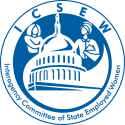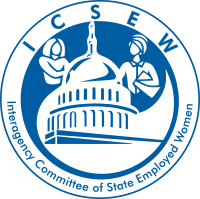January 2020 Meeting Recap: Veterans, Relationship-Building and the 'Afters'
Story and Photos by Rachel Friederich, ICSEW Communications Chair
Experts offered workshops on employment support for veterans, diffusing difficult relationships and effective communications at the ICSEW’s Jan. 21 meeting at the Department of Labor and Industries.
Below is a summary of key takeaways from the meeting. Meeting minutes, full presentations and handouts are available on our meeting minutes and materials page.
Veteran’s Employee Resource Group (VERG)

Jimmie Wimberly talks about the Veteran Employee Resource Group (VERG)
Jimmie Wimberly from the Veteran’s Employee Resource Group (VERG) spoke about the work this Business Resource Group does to support veterans and military spouses. He said the group offers many networking and career guidance opportunities for veterans and military spouses who are transitioning from military life to civilian life. It’s not uncommon for those transitioning out of the military to have trouble translating their military duties into terms civilian recruiters understand.
Military spouses to have gaps on their resume or a series of short term jobs due to frequent relocation that might raise “red flags” for a potential employer. Wimberly said the VERG is there to give veterans and their spouses who are considering state employment or current state employees who are veterans who want to progress in their careers tools and resources they need to reach their professional goals. VERG also works with agencies to help them develop practices on how to recruit and retain veterans.
Resources:
- Jimmie Wimberly: jimmie.wimberly@commerce.wa.gov.
- Statewide Business Resource Groups webpage: https://ofm.wa.gov/state-human-resources/workforce-diversity-equity-and-inclusion/statewide-business-resource-groups
Working with Difficult People

Betty Lochner gives tips on working with difficult people
If someone is causing conflict, you can’t change the way they act. You can only control how you react. That’s one of the messages Betty Lochner from Cornerstone Coaching & Training told attendees at the meeting.
Lochner said these situations often occur because of a lack of trust. She gave tips on how to diffuse difficult relationships with people and suggestions on ways to develop trust:
- Respond with positive intent. Try to figure out why they may be doing a behavior.
- Find ways for people to connect outside their comfort zone. Instead of asking “How are you?” ask something more engaging like “What’s going well for you today?” It gives a person a chance to tell you something they’re excited about.
- Practice intentional gratitude. Try to find the good in every difficult situation.
Lochner said a good way to develop trust is to show you are actively listening and understanding:
- If someone seems upset or is acting in a negative way toward you, don’t offer advice. Instead, use phrases like “tell me more.” Eventually their negative energy may run out of steam.
Lochner also gave some key phrases on how to communicate towards a difficult person if you don’t feel you are being heard:
- I appreciate working with you and I want our relationship to be better. However, I need to tell you about (insert behavior). If I were you, I would want to know about this…
- I feel like you’re not listening to me and here is why…
Resources:
- https://www.cornerstone-ct.com/meet-betty-lochner/
- https://www.cornerstone-ct.com/women-confident-communication-event/
Focus on the Afters

Manny Martinez says the key to good communication is to ask clarifying questions focused on the results
The cost of miscommunication can be great. It can cost employees and employers time and money to redo a task that wasn’t done correctly the first time. Miscommunication can cause mistakes that cost lives. When doing any task, it’s important to focus on the ‘afters.’ That’s according to Manny Martinez, president of Relentless Leadership, Crestcom LLC.
The ‘afters’ are the results, or effects that the task will have. For example, when your supervisor says ‘I need you to write a report on (topic).’ Ask some clarifying future tense questions:
- What are you hoping to accomplish with (task)
- Who is the audience who will be benefitting from (project)
- What is the message you are trying to convey
Resources:

